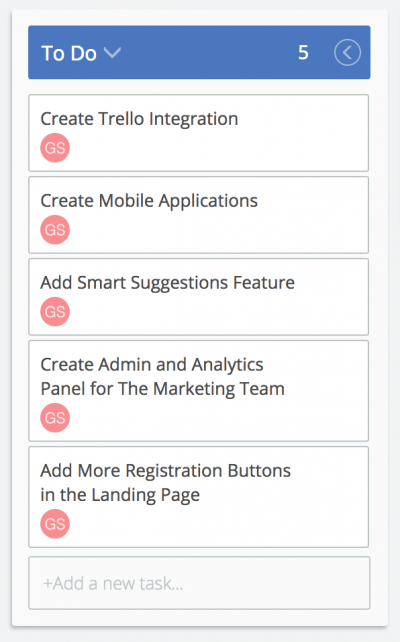George Spasov

I have a confession to make! I am kind of a jerk. I make people feel uncomfortable. Not all the time and not all the people. I do it mostly to Product Owners or the equivalent titles depending on the methodology they follow.
Why I do it, you might ask? It’s good for them and me. How I do it, you might ask? Very simple, I ask them what is the next most important thing to work on and why. Try it yourself. It works miracles. 9 out of 10 times you will hear mumbling or something like “I feel it that way”. Not very scientific and not very convincing.
I’ll pay for my sins tough, by telling you how to help yourselves, your PO and your team out, by finding the right answer – the scientific way.
The case
So here is a simple backlog for you:
Classic example. One way to approach the problem is to go by gut feeling. Mobile is all the hype now so maybe go with a mobile app. Or maybe we should go the scientific route.
THE SCIENTIFIC WAY
The scientific way is a simple relative estimation process that gives a score to all the tasks in regards to the three main components. This way you will find out scientifically where to spend your time first. The framework is actually very very simple so lets dive.
The three components
Complexity

First component you need to give your relative estimation (on the scale from 1 to 10) is complexity. The beauty of it is that the value does not(I repeat DOES NOT) need to mean anything in hours, lines of code, words or any other countable unit. It just needs to be correct in comparison with the other tasks. So if easy task is complexity 1, the next more complex task should be, let say – 5, and the hardest ones – 10. Keep the relativity concept in mind it is used throughout the framework.
Time
The second component is time. Again we are not looking for hours or any other time unit. Just a relative estimation. So if something is quick to do, it should be 1 or 2. If the next task would take longer it should be valued more than 2.
Value Impact
The third and most important component of the scientific way is – value impact. This is the relative business value that this task will bring you. How you define value is up to you – revenue, new users, less bugs – Whatever is correct in your case. Then again we estimate it in relation to the other tasks.
Combination: Your Task Score
Here comes the magic!

Too complex for you? Think about it like this – the best score will be for the task with the greatest value, the shortest time to implement and the least complexity. Sounds great right?
Important: Task without value impact is useless to you – throw it away NOW!
Here is an example for you:
The once mighty Mobile App, does not seem that good now, eh?
Here is how our backlog looks after applying the scoring framework and sorting by score:
I bet you did not expect this one to be the winner, did you?
Due to its relatively high impact, low complexity and quick implementation – the buttons won. The smart suggestions have very high value impact, but are complex to implement and take time. Did you catch the thought train?
Bonus: How to implement it?
You should now be thinking – OK how to apply this framework. You have several options.
Pen and paper
Good old pen and paper – write down your tasks. Set your estimates and calculate. Don’t forget to bring an eraser too – the relative estimates are frequently adjusted due to new-coming tasks.
Spreadsheet
Everything that has a formula in it intuitively goes in a spreadsheet. Write your tasks – have columns for time, complexity and impact and write the formula. It would be a lot faster than pen and paper. Then again you need to make sure you have your tasks in your spreadsheet and your task management system synchronized and aligned.
Recommended Tool: Swip
Swip gives you the scoring framework out of the box. Just input your values and Swip will recalculate real time your scores. Then you and your team can start working on it. No more gut feelings – pure science.
Also shared on the Swip blog.
Find this article helpful?
This is just a small sample! Register to unlock our in-depth courses, hundreds of video courses, and a library of playbooks and articles to grow your startup fast. Let us Let us show you!
Submission confirms agreement to our Terms of Service and Privacy Policy.
Already a member? Login
No comments yet.
Register to join the discussion.
Already a member? Login